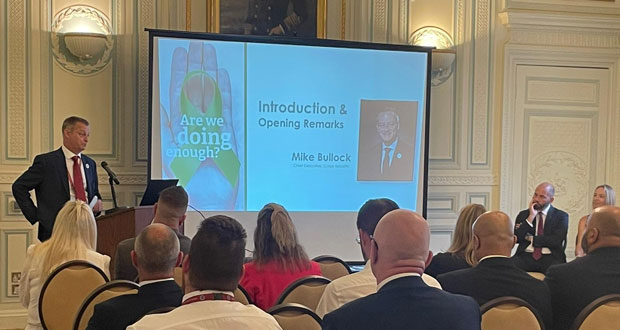This October, Corps Security hosted an event designed to transform mental health in the FM and security sector. Jo Sutherland from Magenta Associates reports
Evidence suggests that mental health affects a high percentage of security professionals. According to a University of Portsmouth study, 40 per cent of security officers displayed symptoms of PTSD. The event encouraged the industry to unite in the effort to break the stigma and to do more to support people encountering periods of poor mental health. Attendees encompassed security professionals and representatives from Combat Stress, Corps and other major security providers.
In his opening address, Corps Security CEO Mike Bullock said it is vital to stimulate conversation and debate. He stressed that the key is to get people talking. That way, mental health will cease to be a taboo topic. More work must be done to ensure that industry professionals, particularly managers and leadership teams, appreciate how serious the subject is.
Industry leaders need to understand the key part they play in making a positive difference to the lives of many. Bullock concluded that better mental health support starts by recognising the signs and pointing people in the right direction, so that they can get the help they need.
Outside of security, mental health problems are on the rise. Recent data suggests that 63 per cent of all long-term absences are caused by poor mental health. Mind, the mental health charity, reports that one in four people will experience a mental health problem of some kind each year in England. One in six also report experiencing a common mental health problem, like anxiety and depression, in any given week.
Unfortunately, these issues are on the rise. Forbes’ 2023 report suggests that depressive symptoms and anxiety disorders are growing by 28 per cent and 25 per cent respectively. Workplace leaders need to be cognisant of the facts concerning what has been hailed as “the next pandemic” to ensure that their duty of care extends beyond visible health needs.
In a heartfelt and moving keynote, Guy Cholerton opened up about his own journey. He is an ex-veteran, security officer, and fundraiser for Combat Stress, the UK’s leading charity for veterans’ mental health. He highlighted common coping mechanisms, such as the tendency to turn to dark humour and alcohol while burying feelings:
“Compression of emotions can have a detrimental effect,” he said.
This is something more men are guilty of, with research suggesting men are less likely than women to speak up about or seek help for mental health problems. A support network and culture of openness can help reverse that tendency.
Fellow speaker Martin Jervis, COO of Thrive Mental Health, reminded the audience that the business costs associated with poor mental health have increased by 24 per cent, costing up to £53 billion:
“The relationship between mental health and the workplace is complex,” he said. “It’s a leadership issue.”
People wander out of being well and not being well. The key is to identify and act upon the first signs of the latter to prevent a crisis. This is not just a ‘nice to do’. A proactive approach to mental health can save lives.
Suicide is a leading cause of death: as of 2019, it caused one in every 100 fatalities. Cholerton cited World Health Organisation research that suggests suicide kills more people than stomach cancer, breast cancer, and psoriasis of the liver. In fact, it kills more people than any other form of violence. “Get to people earlier, before they deteriorate,” urged Jervis.
Corps Security’s mental health champion Chris Middleton offered a call to action to close the event. “The stigma around mental health needs to be eradicated,” he said. “It’s vital to offer empathy and understanding when it comes to an individual’s needs.” This is particularly relevant, he stressed, with the backdrop of the cost-of-living crisis and increasing pressures of modern life.
For more information, including free resources to ensure the resilient provision of mental health support, visit Corps Security’s dedicated Mental Health Commitments page.





